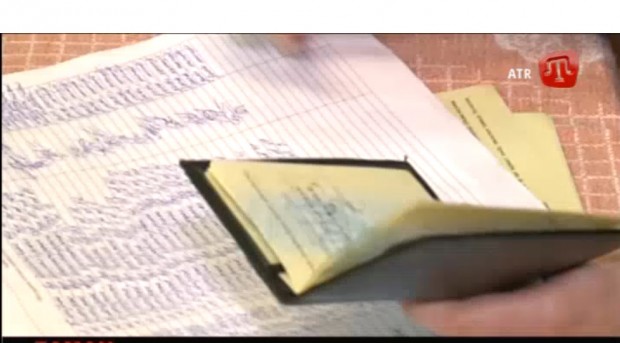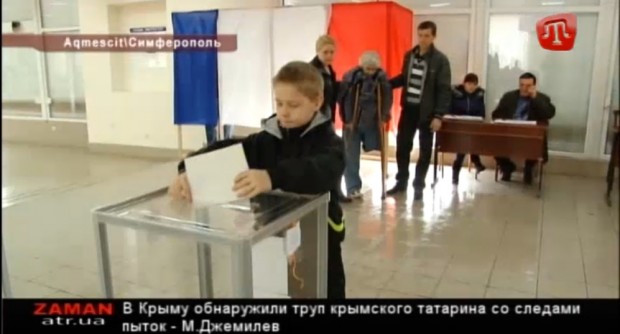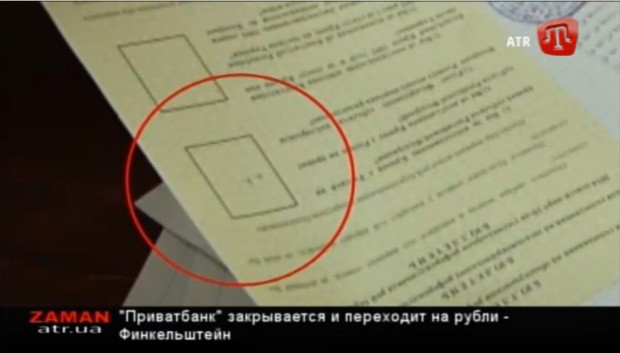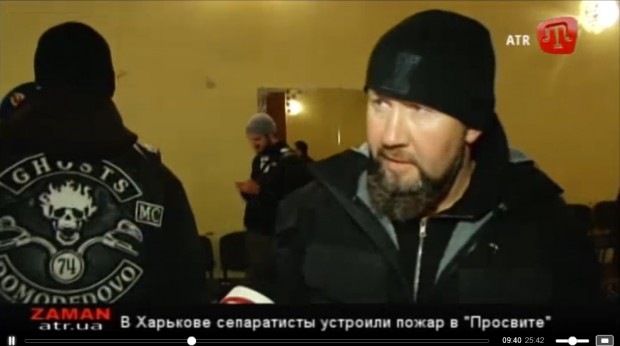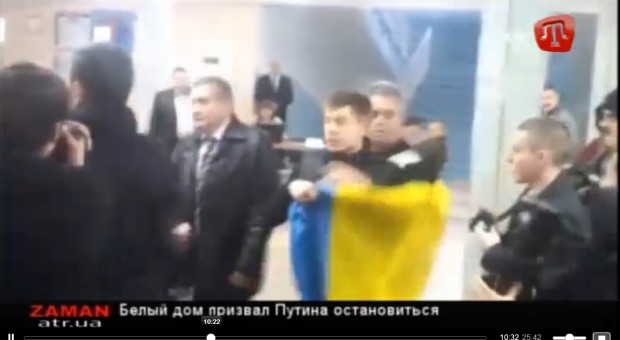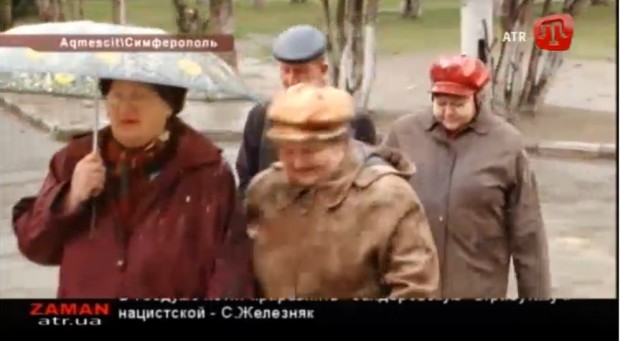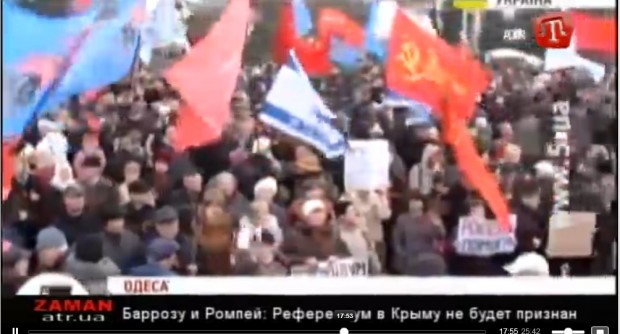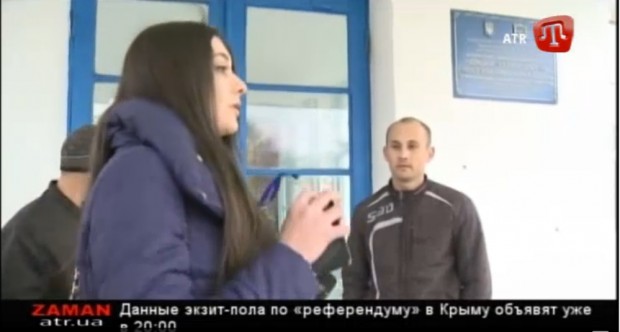Crimea has gone to the polls today to decide, nominally at least, between joining the Russian Federation or reverting to the 1992 Crimean consitution (a declaration of independence from Ukraine in all but name). The referendum has been condemned by both the Ukrainian government and almost all foreign states bar Venezuela, Syria and North Korea.
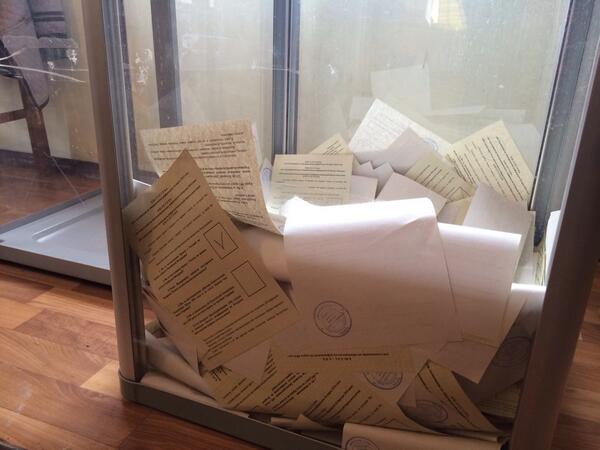
Photo: @obk
Yesterday’s liveblog can be found here. For an overview and analysis of this developing story see see our latest podcast.
Please help The Interpreter to continue providing this valuable information service by making a donation towards our costs.
Below, we will be making regular updates throughout the day:
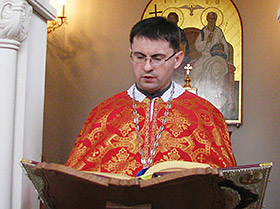
Father Mykola Kvych
Euromaidan PR, citing a report from the Ukrainian Institute for Religious Freedom reports that Mykola Kvych, a Ukrainian Greek Catholic priest who was abducted yesterday, has been released. According to the report, Kvych was held for twelve hours at a police station in Sevastopol where he was questioned and accused of organising provocations in Crimea. Having searched Kvych’s home, where body armour, kept by the priest for ministering to Ukrainian military forces, was found, the self-proclaimed Crimean authorities plan to prosecute him for illegally possessing body armour. The Institute for Religious Freedom point out that possessing bullet-proof vests is not a crime under the Administrative Code of Ukraine.
2359 GMT: Newsru.com has published what it claims are draft negotiating papers prepared by the Russian Foreign Ministry Sergei Lavrov’s talks with US Secretary of State, John Kerry. The document is drafted in both Russian and English. It is important to note here that the United States has made it clear that it will not endorse the February 21 agreement which forms a key part of Russian demands in this document. The proposed resolutions therefore come only from the Russian side. The following text is transcribed from the images uploaded by Newsru.com:
Foreign Ministers…………………………………………………………
Concerned by the situation in Ukraine and the future of its multi-ethnic people,
Recognizing legitimate aspirations of all Ukrainians and all country’s regions to live safely in accordance with
their traditions and customs, have unimpeded access to their culture and maintain broad contacts with their compatriots and neighbors.Noting a special role of civil peace and national accord in Ukraine for the promotion of constructive relations in the Euro-Atlantic region on the basis of equal rights and mutual interests of all States situated there.
Agreed to establish a Support Group in order to facilitate implementation by Ukrainians of priority steps aimed at normalizing the situation in Ukraine and, in this regard, propose that the following actions should be taken:
1. Implement immediately the obligations contained in the Agreement on the Settlement of Crisis in Ukraine of 21 February 2014, to surrender illegal weapons and withdraw from illegally occupied buildings, streets and squares, as well as to conduct an objective investigation into the acts of violence that took polace in December 2013 – February 2014.
2. Convene without delay, by a decision of the Verkhovna Rada of Ukraine, the Constitutional Assembly with equal representation of all Ukrainian regions in order to draft a new federal constitution that would provide for the following:
Enshrine the principles of role of law, protection of human rights and all national minorities, freedom of speech and activities of political parties and mass-media, as well as other principles underlying Ukraine’s political system as a democratic federation state possessing sovereignty and neutral military and political status;
– Russian along with Ukrainian will be given a state language status while other languages will be given a status in accordance with the European Charter for Regional or Minority Languages;
– Regions will independently elect their legislative and executive bodies through a direct vote and have wide authority, reflecting the cultural and historic specificity of each to them, with regard to economy and finance, social sphere, language, education, external interregional relations, while ensuring protection of rights of national minorities living in each of the federation constituent entities;
– Interference in church affairs and interfaith relations will be prohibited and subject to prosecution.
New draft constitution shall be adopted by the Constitutional Assembly on the basis of the agreement of all participants.
Draft Constitution shall be put to a popular referendum
3. Following the adoption of the new constitution, national elections, under broad and objective international observation to Ukraine’s supreme state bodies should be immediately scheduled, and elections to legislative and executive bodies in each constituent entitiy of the federation should be scheduled simultaneously.
4. The right of the Autonomous Republic of Crimea to determine its future, following the free expression of the will of its population during the referendum of 16 March 2014, shall be recognized and respected.
5. Ukraine’s political and government system based upon the above mentioned principles, as well as its sovereignty, territorial integrity and neutral military and political status, shall be guaranteed by Russia, the European Union and the USA with adoption of a UN Security Council resolution.
***
Foreign Ministers of the Support Group countries stand ready to actively assist all Ukrainian sides in implementing the proposed measures and principles and undertake to respect the arrangements achieved upon this basis.
2115 GMT: ATR supplied more details this evening on the body of a Crimean Tatar man found in Zemlyanichny Belogorsk with marks of torture. Journalists say authorities have tried to keep information about the case, being investigated as pre-meditated murder, from the public. But local witnesses report that the victim was found naked, his face wrapped with duct tape, and his hands bound by handcuffs not manufactured in Ukraine. The victim is believed to be Reshat Ametov, a man who took part in a demonstration against the annexation of the Crimea who went missing on 3 March. Relatives have viewed the body and police expect to make a statement tomorrow.
Police also report that now two more Greek Catholic priests have been abducted bringing the total to three: Fr. Mykola Kvych, of Sevastopol and Fr. Bohdan Kostetsky of Evpatiya. Also missing is Igor Gavrilov who was in the car with Fr. Kostetsky.
2050 GMT: The Crimean Tatar TV station ATR has reported at 19:30 pm local time on numerous violations of election law during the referendum. While the self-appointed government of Sergei Aksyonov is already celebrating, official results will not be announced in parliament until tomorrow morning. Turnout was 77.9% according to Mikhail Malyshev, head of the Commission for the All-Crimean Referendum on Status of Crimea; the highest turnout was in Kerch, where 82% of eligible voters appeared, and the lowest in Belogorsk and Kirov Districts, where there were still more than 50% of voters. In many districts, the number of votes on the additional lists exceeded the number of existing voters on the rolls.
Reporters found that in districts with high concentration of Crimean Tatars, there were no votes or only a few; Crimean Tatar leader Mustafa Dzhemilev said that 90% of the Crimean community boycotted the referendum. While many people did turn out enthusiastically despite rain, the high numbers seemed to be boosted by the unlawful system of accepting registrations on the spot from people who said they were not in existing voting lists. Just by showing a passport, anyone could be entered into the list, and there was nothing to stop people from going to multiple polling locations and voting repeatedly. ATR reported that according to election law, members of the local election commission are supposed to vote on whether to admit people to such additional lists, but this procedure was not followed.
Camera crews caught obvious violations like children voting…
…ballots pre-marked by election personnel…
…gun-toting self-defense units refusing to show ID or explain who they were, and men with St. George ribbons instead of the expected neutral observers…
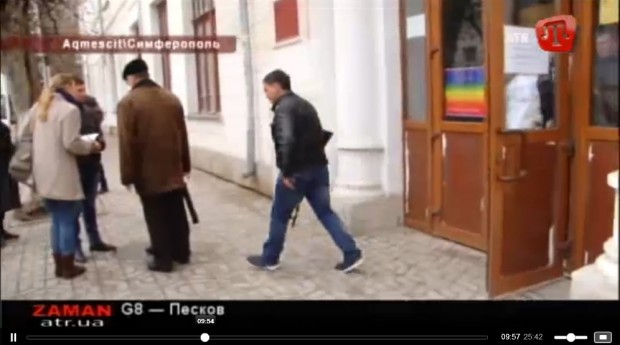
…and biker gangs from Russia who said they were “maintaining order.”
While Aksyonov himself was voting, a man tried to unfurl a Ukrainian flag and was hustled away by self-defense operatives.
Despite the inflation of votes and show of force, numerous freely-obtained exit interviews by ATR indicated that by and large, people voted to join Russia in the belief that they would receive higher pensions and wages, and would obtain security after the upheavals following the change of government in Kiev. Some indicated they would have to pass through a period of difficulty before they could reap the awards.
ATR reported that there were a number of pro-Russian demonstrations elsewhere in Ukraine, with some crowd staging mock referendums. One such demonstration in Odessa drew 5,000 people, some waving communist flags.
Journalists found they had trouble gaining entry to polling places even when presenting special referendum accreditation; they were told that they also had to be wearing special white caps, although these were not issued to all press. Camera crews were told they could not film due to lack of space.
2012 GMT: Crimean Prime Minister Sergey Aksenyov just posted this tweet, which states: “We’re celebrating!”
Мы празднуем! pic.twitter.com/uSPTsdjXMB #Крым #Симферополь #Россия #КрымРоссия
— Сергей Аксенов (@sergyaksenov) March 16, 2014
One Twitter user had a sarcastic remark to make based on the picture — his message is that people did not seem so intimidated.
Кровавый режим лютует. Тысячи запуганных людей собрались праздновать в Симферополе под дулами оккупантских автоматов pic.twitter.com/r09mAq91Hm
— Leo Szekeres (@LetheLeon) March 16, 2014
A bloody regime being cruel. Thousands of frightened people have gathered to celebrate in Simferopol at the barrels of their occupiers’ assault rifles
1954 GMT: Reuters reports on the storming of a Ukrainian cultural centre by pro-Russian activists in Kharkiv. The activists then began burning Ukrainian history books and texts on the Holodomor, the terror famine from 1932-33 that killed at least 3.3 million Ukrainians:
In Kharkiv, Reuters Television footage showed pro-Russian activists scaling an iron gate, smashing a van and breaking into the offices of a Ukrainian cultural center. Two policemen stood nearby, examining the van.
The footage then showed young men seizing Ukrainian-language books, including a volume devoted to the 1932-1933 man-made famine in Soviet Ukraine, which killed from 7-10 million people.
“Do you see what they print here?” one activist said to another.
The activists then took the books into the street and set them alight in small bonfires, along with posters from the extreme-right wing Right Sector group.
#Ukrainian ‘Prosvita’ building in #Kharkov. Books on History of Ukraine & Hunger-extermination burned by separatists pic.twitter.com/CA4cOT7qBC
— Euromaidan PR (@EuromaidanPR) March 16, 2014
1817 GMT: Zeke Miller, political reporter for Time has uploaded a statement by White House Press Secretary Jay Carney on Russia’s actions in Crimea. Carney brands Russia’s actions “dangerous and destabilising.”
Carney on Crimea referendum: “Russia’s actions are dangerous and destabilizing” pic.twitter.com/pfAmgxLTRG
— Zeke Miller (@ZekeJMiller) March 16, 2014
1807 GMT: Russian state news agency RIA Novosti is reporting that exit polling has reported 93% of Crimean voters chose to join the Russian Federation.
Exit poll: около 93% жителей Крыма проголосовали за присоединении к РФ
— РИА Новости (@riabreakingnews) March 16, 2014
1753 GMT: Censor.NET is reporting the discovery of the body of a Crimean Tatar man with signs of torture:
In Crimea, the body of a Crimean Tatar man has been found with signs of torture.
Euromaidan activist and singer, Ruslana, wrote about this on her Facebook page with reference to the leader of the Crimean Tatars, Mustafa Dzhemilev, reports Censor.NET. “This happened in the Zemlyanichny Belogorsky area. The man went missing on either the 3rd or 4th of March. The last report of him was that he had gone to the military recruitment office and then disappeared”, said Ruslana.
According to her, his body was found on March 16 with clear signs of torture. “Handcuffs were found next to him, his head was bound up with duct tape. His body has been taken for examination”, says the statement. Censor.NET earlier reported that the Crimean Tatars would a peaceful mass rally against the “referendum”.
1726 GMT: The Centre for European Policy Studies (CEPS) has published a paper entitled Is Europe vulnerable to Russian gas cuts? In it, the think tank points out that “less than 6% of the EU energy mix currently is dependent on Russian gas”.
In addition, the share of Russian gas in total EU gas imports (including LNG) has decreased slightly from 39% in 2009 to 36% in 2012, despite growing total import dependence. The resulting market loss of Russian gas is comparable to the annual gas consumption of the Czech Republic.
While import dependence in the EU remains high, Russia may be more dependent on export revenues from its gas than the EU is on gas imports from Russia. Some 53% of Russian gas exports go to the EU worth an estimated $24 billion (€17 billion). Gazprom and the Russian state budget are thus highly dependent on exports to the EU and further supply disruption could lead to increasing efforts by EU member states to replace Russian gas with other alternatives. While it would certainly be difficult for the EU to completely replace Russian gas in the short-term, it could at least partly replace gas from Russia with Algerian, Qatari or Nigerian LNG (re)diverted to EU terminals (albeit with a significant price tag1), as well as with piped gas from Norway, which still has capacities to increase exports to the EU.
Furthermore, coal and (domestic) lignite could substitute gas in electricity generation at least in the short-term. In the longer run, there is scope for increased LNG reception capacity that could be built, having in mind that the US is currently contemplating investment in LNG export facilities. If Russia were further to escalate geo-political tensions over Ukraine, the prospect of the EU and US making a concerted response of this kind would become an obvious matter for consideration, even if such investments would be very costly and take many years to implement. From the Russia standpoint, however, if the Kremlin actually provoked such investments, it would gravely undermine their economy’s primary asset.
The paper also notes that Europe is now entering spring following an unusually mild winter, meaning that gas reserves are high.
Meanwhile, Ukrainian news agency UNN reports that Right Sector leader, Dmyrto Yarosh, has threatened to destroy Russian gas infrastructure in retaliation for Russia’s occupation:
We remember that Russia makes money by running oil and gas to the West through our pipeline, – therefore we will destroy this pipeline, depriving our enemy of this source of funding.
1709 GMT: Ukrainian Prime Minister Arseniy Yatseniuk has announced a major tightening of the border with Russia. The Kyiv Post reports that Yatseniuk said, during an emergency meeting of the Cabinet of Ministers today, that Ukraine’s eastern border has been almost completely shut down.
Many Russians have been refused entry to Ukraine if they are suspected by border guards of being sent to Ukraine to stir up demonstrations or cause violent unrest. Deadly demonstrations have taken place in the last week in Kharkiv and Donetsk, killing at least three people.
At the same meeting, Yatseniuk reminded ministers that those who illegal advocate separatism will be prosecuted.
1704 GMT: More evidence of Ukrainian military movement in the East today here:
There is now some serious Ukrainian armour wondering around in Eastern Ukraine http://t.co/W1IJyyVBUV
— Daniel Sandford (@BBCDanielS) March 16, 2014
The youtube poster identifies the vehicles as T-64 tanks and BMP armoured infantry carriers.
1652 GMT: While the polls in Crimea have yet to close, Chechen President Ramzan Kadyrov has congratulated Crimean separatists via Instagram:
Kadyrov’s message reads:
Dear friends! The referendum has taken place in Crimea! More than half of the electorate voted a few hours ago. It is universally acknowledged that it took place without any violations. Based on preliminary data, the people have answered “yes” to the question on joining Russia. I have just had a telephone conversation with the premier.
1600 GMT: While Russia is presenting the referendum today as a move to save the region from neo-Nazis, a large number of the ‘independent observers’ spotted monitoring the vote today come from Europe’s extreme right.
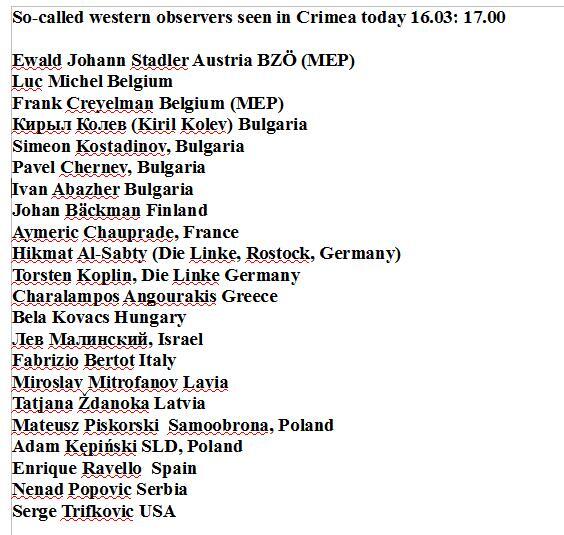
A sample of the far right figures here includes:
Bela Kovacs – a Hungarian MEP for the neo-Nazi Jobbik party.
Aymeric Chauprade – a nationalist, pro-Russian political theorist and member of France’s far-right Front National, whose leader, Marine Le Pen has supported Russia’s stance on Ukraine and condemned “extremists” in the Maidan movement.
Frank Creyelman – a Belgian MEP for the far-right Vlaams Belang party (formerly Vlaams Blok).
Ewald Johann Stadler – an MEP in the late Jörg Haider’s Bündnis Zukunft Österreich (Alliance for the Future of Austria).
Luc Michel – active with various neo-nazi groups in Belgium and is a supporter of Eduard Limonov’s National Bolshevik party.
Others include communists or those with nostalgic sympathies for the Soviet Union such as Angourakis and Al-Sabty, or those with extremely close ties to United Russia such as Johan Bäckman. Bäckman is a finish Finnish political activist who has been involved with pro-Russian actions in both Finland and Estonia, including involvement with Nashi activity.
1512 GMT: Buzzfeed‘s Mike Giglio now reports that the pro-Russian crowd in Donetsk has left the Security Services building, protested outside another local government building, and now moved on again.
Protest leader asks crowd to leave Donetsk security hq. “We have shown we are serious.” They don’t agree, until someone says gov office next
— Mike Giglio (@mike_giglio) March 16, 2014
Standoff now outside Donetsk gov office between protesters and riot cops pic.twitter.com/XhT7Vj0yZw
— Mike Giglio (@mike_giglio) March 16, 2014
Donetsk protesters at gov building again moving on. No confrontation. Police do everything possible to avoid it
— Mike Giglio (@mike_giglio) March 16, 2014
Meanwhile, Ukrainian journalist Natalia Melnychuk suggests a possible explanation for this itinerant protest:
All these useless attacks on empty Sunday’s govern’t bldngs in #Donetsk give an impression it’s staged for the Russian TV. #Ukraine — Natalia Melnychuk (@pravolivo) March 16, 2014
1457 GMT: Here is a photo of a Crimean resident in Belogorsk being brought a polling box to cast her ballot into from her home. While an accepted practice since the Soviet era, such home-voting can mean the vote is not taking place in strictly neutral locations under the eyes of monitors. Certainly it is one way to expand the franchise.
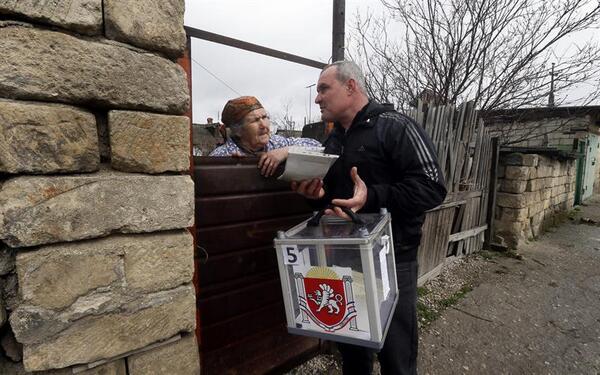
Photo: @mikekomar
1451 GMT: There have been pro-Russian protests again in Donetsk today. Protesters are calling for the release of the separatist, self-proclaimed ‘people’s governor’, Pavel Gubarev. Buzzfeed‘s Mike Giglio reports the size of the crowd as being no more than 5,000. He says that the turn out is significantly smaller than yesterday’s protests there, with significantly more police in attendance.
Standoff at Donetsk security building has maybe 1/5 the protesters and 3x the cops of yesterday’s — Mike Giglio (@mike_giglio) March 16, 2014
Despite the increased security, the police, who are likely to be wary of using excessive force so as avoid providing a ‘provocation’ for the Russians to use, have been unable to prevent the crowd from pushing into the Security Service Headquarters. The crowd has previously stormed and occupied the building twice in the last week.
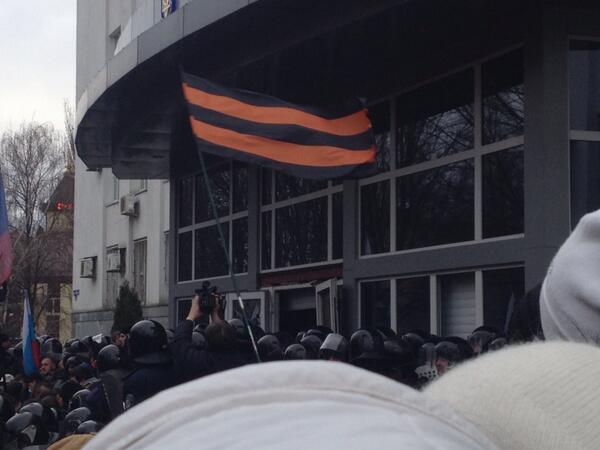
Photo: Steve Rosenberg (@BBCSteveR)
1400 GMT: Reuters reports that the defence ministries of Russia and Ukraine have agreed on a truce in Crimea until March 21. Ihor Tenyukh, the Ukrainian defence minister announced that:
“An agreement has been reached with (Russia’s) Black Sea Fleet and the Russian Defense Ministry on a truce in Crimea until March 21. No measures will be taken against our military facilities in Crimea during that time. Our military sites are therefore proceeding with a replenishment of reserves.”
Earlier today, that had been reports of large movements of Ukrainian military forces towards the East:
Наши танки едут защищать дончан от оккупации РФ http://t.co/4dhb8horXUукраинские-танки-едут-защищать-донба/ pic.twitter.com/BgHMjyZqvJ
— Новости Донбасса (@novostidnua) March 16, 2014
This tweet, from local news agency Novosti Donbassa, says:
Our tanks are travelling to defend Donetsk from occupation by the Russian Federation.
1354 GMT: Voting instructions were made as clear as possible to the Crimean electorate today:
“Sample” #ballot outside polling site. Big #red mark next to #russia option. example or instructions? #Crimea #Крым pic.twitter.com/JMXIPS63G5
— Noah Sneider (@NoahSneider) March 16, 2014
However the alternative option to restore the 1992 constitution would leave Crimea’s attachment to the Ukraine tenuous at best. As a result the Kyiv Post described the referendum as a choice between joining Russia now, or later.
There have also been reports that Russian nationals have been able to cast votes in the poll. Ekaterina Sergatskova, a Russian journalist, reported that she had been allowed to vote in the referendum by electoral officers despite her telling them she was Russian. The officials told her that as she was a resident in Simferopol she could cast a vote.
